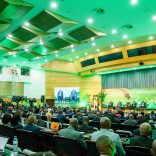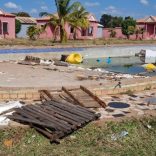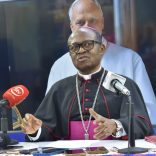Mozambique: President advocates mandatory community consultation for land use rights
Mozambique: Government to forge ahead with three new ‘urban centres’ in three provinces

Photo: Ministério das Obras Públicas, Habitação e Recursos Hídricos-MOPHRH
Mozambique will build new urban centres in three provinces to create housing opportunities for young people, improve land use planning and stimulate local economies, the government announced on Thursday.
“It is the government’s responsibility to ensure social housing for low- and middle-income families and to create infrastructural conditions and public policies that facilitate initiatives contributing to access to housing,” said Minister of Public Works, Housing and Water Resources, Fernando Rafael, during the opening of the ministry’s 11th Coordinating Council in Maputo.
“Preparation of the new integrated urban centres is underway,” Rafael explained. Housing, commerce, services and leisure facilities will be built, mostly from scratch, in Matutuíne, Maputo province (south), Mocuba, in Zambézia province (centre), and Lichinga, the capital city of Niassa province (north).
Fernando Rafael noted that the government was making it a priority to promote and facilitate private initiatives to meet the growing demand for serviced land and affordable housing in the country.
He underlined that the implementation of the policy “will contribute to creating new housing opportunities for young people, improving land-use planning and stimulating local economies”, stressing that it is not the “exclusive” responsibility of the state to build housing for the population.
According to the minister, the housing sector represents “a driver of economic development, fostering a value chain” that involves industry, employment, engineering, credit and innovation.
The Mozambican government in June acknowledged “persistent challenges” in the areas of housing and urban development, including the growth of informal settlements and unplanned neighbourhoods, and announced plans to build more than 12,000 homes by 2029.
“Over the next five years, we aim to build 12,100 homes, with particular emphasis on the housing projects in Maputo city, and in the petrochemical city in Vilankulo district, Inhambane province, which will provide more than 6,000 homes,” Fernando Rafael said at the time.
He also noted that Mozambique’s population growth, estimated at 2.5% per year, presents challenges for the construction of “new urban centres” across the country, reinforcing the government’s responsibility to develop sustainable urban infrastructure that improves Mozambicans’ quality of life.
The 12,100 homes will be built in partnership with the private sector, Rafael said, adding that by 2029 a further 7,500 homes are expected to be upgraded under the Northern Mozambique Urban Development Project.
Over the next five years, Mozambique also expects to reach the target of 49,200 serviced plots with access to water, electricity, sanitation and “areas reserved for public services”, giving priority to provinces with the highest population density and greatest urban pressure.













Leave a Reply
Be the First to Comment!
You must be logged in to post a comment.
You must be logged in to post a comment.